- Home
- Fay Weldon
Moon Over Minneapolis Page 2
Moon Over Minneapolis Read online
Page 2
‘Sorry I spoke. No need to snap,’ said Daisy. ‘Everyone snaps in here. It’s the stress.’
And what you knew you grew to need, couldn’t do without. The luxury of her bedroom: with its view over the city: the sense that it honoured you, found you special: the routine of early morning: the private, leisured silk, carefully chosen, against the skin: the softness of pale carpet; again yet softer, paler feet as you searched with your toe for your slipper, warm and safe inside while wind and rain and nature pattered against the pane. She didn’t want to give it up. Other people, men, babies, intruded into the eroticism of solitude. Perhaps you had to get married before you were twenty, have babies before you were twenty-five, before you knew what there was to miss.
‘Are you really nearly forty?’ asked Daisy, looking across from her computer screen, ‘because you don’t look it.’ Oriole smiled coldly; perhaps this impossible Daisy was a temp: filling in for someone who must surely know how to behave, and understood without being told that the personal information now freely available about everything and everyone to any girl with a computer at her fingertips had somehow, in the interests of the social niceties, to be referred to but at the same time tactfully overlooked.
‘Mind you,’ said Daisy, ‘we get people in here up to fifty, but mostly they’ve got six already and it’s medical. Lots of women have babies at forty.’
‘More fool them,’ said Oriole shortly: she would have stayed silent if it weren’t for the sudden flow of words from Daisy’s hairy mouth which filled the pale-pink room in a dangerous way, and might break the silence for ever if they were not somehow stilled. It didn’t work.
‘There are tests for Down’s Syndrome,’ went on Daisy, ‘if that’s what you’re worrying about.’
‘I hadn’t even considered it,’ said Oriole. Nor had she. A non-child cannot have Down’s Syndrome or, if it does, can hardly suffer from feelings of inadequacy on that account; not during its brief putative existence.
‘Lots do,’ said Daisy. ‘You’d be surprised. It isn’t a nice job, this: but if I don’t do it someone worse will.’
‘It seems perfectly reasonable work to me,’ said Oriole. ‘I imagine there is a high degree of job satisfaction. You’re working in the community, with people, in a healing environment, meeting very important human needs.’
‘Is that what I’m doing?’ asked Daisy. ‘It seems to me I’m working for a crew of murderers and not even getting danger money.’
‘What sort of danger?’ asked Oriole, startled.
‘Being hated,’ said Daisy. ‘People just sit where you’re sitting, waiting, beaming out their dislike.’
‘Perhaps it comes from the babies,’ said Oriole, before she had time to think. ‘Perhaps the hostility comes from them. They can hardly thank you for what you’re doing. Well, not doing. But for helping organize the doing. That is to say the doing-away-with.’
‘Oh thank you,’ said Daisy. ‘That’s a real help. Ta very much.’
She swung her swivel chair so that her back was to Oriole. Her hair was greasy. There was a yellowy stain down the back of her white coat.
Oriole thought, this is me, Oriole Green, sitting in a female clinic having a spat with a greasy girl at a computer. This is where love leads you: or sex, while it lasts. And of course it wouldn’t last, couldn’t. The gap between affairs lengthened: she noticed it. Once one lover trod hard upon the heels of the last: now years could intervene: the diary of love had long, long stretches of nothingness. Last chance, last chance. She might still find someone like herself, intolerably busy, to settle down with, subject to diary, to provide a baby with a proper home but, come to think of it, she doubted it. Last chance!
‘Daisy,’ said Oriole, ‘there’s a yellowy stain down the back of your overall. I only mention it because you can’t see it, and I expect your employers put quite a price on smartness.’
‘They put a price on murder,’ said Daisy, ‘Nothing else. I could wear a butcher’s overall for all they cared. Bloodstains and all. How much are they asking you, Oriole?’ She consulted the screen. ‘Eight hundred and twelve pounds plus anaesthetic fees. Wow! Of course, you are forty. That puts the insurance premiums up. Most women get out at about six hundred. No reduction for quantity, it seems, or you’d be less. And the stains down the back of my overall will be baby sick. And my own view is if you have a baby you should stay home and look after it, but chance would be a fine thing, wouldn’t it?’
‘Chance,’ said Oriole, wings healed, spirits soaring, ‘is a very, very fine thing,’ and when the smiling nurse with broken teeth came in to take her and her overnight suitcase up to her room, she said she’d, changed her mind.
‘You’ll lose your deposit,’ said the nurse, her smile simply blanking out, not even fading. ‘Your room being booked, and the operating theatre too. We can’t rebook at this late stage. These last-minute changes of mind are very inconsiderate of others. And we’ve had a whole spate of them lately.’ The nurse looked very hard at Daisy, knowing perfectly well whose fault it was, but Daisy had fallen sullen and silent again and didn’t so much as raise her eyes from the screen.
As for Oriole, she asked for a year’s leave of absence on full pay and got it, with no argument from anyone. If you do the unexpected, unexpected things happen.
I Do What I Can and I Am What I Am
THERE IS A DRAGON tattoo on the back of Romula’s left hand, for all the world to see, and engraved in her heart (as Calais was, they say, in Queen Mary’s) is the phrase ‘I do what I can and I am what I am’. In Romula’s mind dragon and words are interconnected. A tattoo’s there for life, and that’s that, and Romula doesn’t mind one bit, so long as the phrase stays too.
I do what I can and I am what I am.
Let me tell you more about Romula. Last year she won the Miss Skyways Competition. She won against 82 other girls, all cabin crew—air hostesses, as we used to say—on International Skyways. She deserved to win: not just because she was pretty, and smart, and efficient, and friendly, and everyone liked her, but because she loved her job: it never ceased to thrill her: to fly the Airways of the World, to be the girl in the ad: to watch the mountains moving by below, the plains unfolding: sometimes she would catch her breath with the pleasure of it all. It was her gift, never to be blasé. Romula, years into her job, would still look out of the aircraft window on a clear day, when there was nothing else to do—which was not often, granted—and marvel at the miracle of flying. She would go forward into the cockpit with the crew’s food—different dishes for everyone, in case of food poisoning—and watch their strong male hands move amongst the instruments, and rejoice at the luck which got her to this place, this point of time, this source of power, this wonderment.
‘You what?’ demanded Liz her mother. ‘You won what? Miss Skyways? For God’s sake keep quiet about it.’
Liz Ellis was a hard-working, hard-drinking, high-thinking feminist. She hadn’t worn a skirt since she was pregnant with Romula, and that was twenty-four years ago. She’d stopped Romula playing with dolls, slapped her if she dusted, tried to give her a proper education so she could take a meaningful place in society, and look what happened. Miss Skyways. Handing out G and Ts to businessmen. What sort of life was that?
Sometimes, when Romula went forward to the cockpit, she’d catch the eye of the pilot, or the first officer. Of course she did. How could she not? Hotels in far-off places can be lonely: the camaraderie of the air is strong: tension and danger demand relief: excitement smoulders in the sky as well as on the earth: like salt on meat, passing sex brings out the full flavour of a rich life. Sometimes the sex trembled on the edge of love; never quite, for Romula.
I do what I can and I am what I am.
Men would take Romula’s small hand, hold it, pass a finger over the lines of the blue, curling, disfiguring dragon and say, ‘How did you come by that? What happened?’ But she never told them. She told me, though, when I met her at breakfast in Singapore, so I’m telling you. S
hould you come across her, when you travel Skyways, should the little lace half-glove on the hand of the girl who brings your coffee, tongs out the hot towels (Club Glass only), slip back to reveal the macho stamp of the dragon, please keep it to yourself. I wouldn’t want her to think a confidence had been betrayed. Details have of course been altered to protect her identity. And in a way it is everyone’s story: everyone, that is, who doesn’t do what their mother wants.
I do what I can and I am what I am.
When she was fourteen, Romula had the prettiest hands: soft but not puffy, delicate but not feeble, slender fingers just right for rings—not so short they looked stubby, not so long they seemed to have a life of their own and were scary, as fingers can be; her nails were healthily pink and almond-shaped: the skin of the hand translucently white—but then she was a natural blonde: blue veins made a faint tracery beneath the skin, and the ones on the back of her hand travelled straight to her heart, she knew they did.
‘Romy, stop waving your hands about and get on with your homework! The way out of all this is education.’ Liz’s hands were big, square and rough: they were competent: they made you feel safe: only once had Romy’s father raised his fist to Liz and Romy—that was when Romy was three—and Liz had pushed him out the door for ever.
‘We’ll manage on our own,’ she said. ‘No man’s better than half a man,’ and presently she was standing on platforms waving her own big, effective hands about, speaking on the rights of women, while little Romula stood somewhere apart, standing on first one foot, then another.
‘When I grow up,’ said Romula at five, ‘I’m going to be a nurse.’
‘No, you’re not,’ said Liz and all her many female friends in chorus. ‘You’re going to be a doctor.’
Romula thought that was a perfectly horrid idea and took off her dungarees and borrowed one of Sylvie’s party dresses (Sylvie lived next door and Liz wished she didn’t) and went straight out and played in the garden like that. She wasn’t often so naughty, though. She cried afterwards and told Liz she didn’t know why she did it, and it was true, she didn’t.
I do what I can but I’m not what I am.
When Romula was crossed in love or unhappy in any way she’d develop a little wart where the top of her thumb rubbed against her forefinger. When she was in love again, happy again, it went away. Men looked at Romula’s hands a lot, in a speculative way, which at first vaguely alarmed her. Other girls had legs which got looked at, or necks, or breasts, or eyes—it was Romula’s hands which mesmerized, promised, enchanted.
That was what women did to men, Romula believed, at sixteen. Mesmerized, promised, enchanted. Then they married you and you lived happily ever after. She told her mother so. ‘What are you talking about?’ shrieked her mother. ‘Dear God, what am I going to do with you?’
Romula was struggling with physics, chemistry, biology: her mother had to fight the school’s obstinacy, stupidity and sexism to achieve it. And she had. Liz always got what she wanted. Romula was to be a doctor. The pressure of the pen raised a blister on Romula’s middle finger. The blister went septic. She couldn’t work for months, it hurt so; she failed exams.
I try but I can’t and I’m not what I am.
When she was sixteen, a fortune-teller read Romula’s palm. ‘What pretty hands,’ she said. Well, everyone said that. But then she said—‘You’ll grow up to break your mother’s heart. See there, the gap between the head line and the life line, where they rise. That’s good for the child, bad for the parent. Unbiddable!’
Yet Romula was the sweetest, gentlest thing. Not a scrap of her father in her, that roistering, fornicating, loud-mouthed bully. Liz missed Romula’s dad, for all she claimed she didn’t. Romula knew it. But when men go, women must make do, and Liz had her pride. Everyone makes a virtue of necessity.
When she was seventeen Romula said to Liz, ‘I’m going to the fair with Sylvie.’ Sylvie was still living next door. Sylvie giggled a lot. She had little red raw knuckly hands which were never quiet: ‘Like her mouth,’ said Liz. Sylvie had left school: now she did nothing in particular. She wore very short skirts and her hair was yellow-blonde, not natural blonde, like Romula’s. ‘Why do you have to go with Sylvie?’ asked Liz. ‘Come to that, why do you have to go at all?’ There was a reason Liz didn’t approve of fairs—something to do with either goldfish or equal opportunities, though Romula couldn’t be bothered to remember which. Romula was going to the fair, and that was that. Everyone was going to the fair.
‘Who else is there to go with?’ said Romula, snarling.
‘Jo,’ said Liz. ‘Since you insist on being heterosexual.’ Jo was Liz’s friend Evelyn’s boy. He was training to be a social worker. He was sensitive and caring, and stuttered.
‘I like Sylvie and I don’t like Jo,’ said Romula. ‘And Jo may be what you see as heterosexual but I don’t and nor does Sylvie.’
Honestly, she was a misfit: a prawn in a pool of gleaming trout.
What her mother had to put up with!
I do all I can but I’m not what I am!
And then Romula had a really big row with her mother. Liz had just read Romula’s school report. Romula had a sweet disposition (Liz: They must be joking!), a caring nature, was popular with friends and teachers, and tried hard at lessons. She had an A in Housecraft (now a unisex subject after Liz’s letters to the school), a D in
Biology, and E’s in Chemistry and Physics. (Liz: They’re doing it on purpose. They must be!)
‘Romula,’ said Liz, ‘you are an embarrassment to me and always have been and that’s that!’
‘I suppose you wish you’d never had me,’ said Romula.
‘I wouldn’t go as far as that,’ said Liz. ‘But it might have been easier if you’d been a boy, and I never thought I’d live to hear myself say that. I should have groaned when you came out, not cheered. Go to the fair, if that’s what you want, and good riddance.’
Romula gelled her hair and went to the fair in a short mauve frilly skirt and white lace top borrowed from Sylvie. She had to wear her trainers because that was all she had and she was a size 7 and Sylvie a size 3, but they looked okay. She wore a glass diamond ring on each finger: and, such was the magic of her hands, they didn’t look cheap and nasty at all.
It was a warm excited night: honky-tonk tunes and sentimental ballads fought it out between and over the rides, the stalls, the shrieks and screams, the arcade machines. The lights on the ground dimmed the moon into nothingness. The site was crowded, but not so you couldn’t move. Romula and Sylvie had paper money in their pockets. Romula felt quite peculiar: elated and ashamed by the last thing she’d said to her mother: for some reason it made her skip about.
‘I’d have left you too if I’d been my father.’
‘He didn’t leave, I threw him out.’
‘I don’t believe you,’ cried Romula in triumph. ‘You made him feel useless, you made him feel wretched, so he left, and I expect now he’s the happiest man in the world. I hope he is!’
That’d teach her! Mother, stony-faced dragon in jeans and a sweatshirt. But she was a good woman too: she worked at the Well Woman Centre, for the love of people (well, women), not money.
You had to acknowledge it. Only not just now, just not tonight, the night of the fair.
Sylvie and Romula stopped by the Super Disco Waltzer, and fathers with children on their shoulders brushed by (and Sylvie shrieked because now there was candy floss in her hair). And they wondered if they dared.
I do what I dare and I am what I am.
The floor of the Waltzer rotated, faster and faster round its mirrored central pivot, and from its central mirrored pivot music streamed, and jets of steam which spurted out rainbow fog, and through the fog the murmur of a female voice—‘You want to go faster? Scream louder! Scream louder!’—poured like soft liquid over the clutching, shrieking, dizzy riders, and the louder they screamed the faster they spun, for as the floor rotated it rose and fell: and on this moving, surging bas
e the open cars rotated and spun; and disco lights and spotlights swung and danced and raced from the whirling ceiling above: and all of a sudden Romula saw the ride attendants, the Princes of the Fair, one for every three cars, the young men who rode the Waltzer for their fairground living, who battled with the surging floor like fishermen in a storm, dancing and leaping to stay in the same place; their task to spin the cars as they passed.
‘Fixed orbit satellites,’ said Romula to Sylvie. (Romula paid attention in Physics whenever the subject left the ground. Above a hundred feet and Romula listened. So our vocations make their presence known in early life.) As for Sylvie, she had no idea what Romula was talking about. How could she?
Romula thought she’d never seen anything so beautiful, so magical as the young men, strong, lithe, muscled, not a brain in their heads, as Liz would have said, and who cared? She thought she would faint. The men lunged and pushed, and round and round them went the cars like crazy things, with the white stunned faces of the riders appearing and disappearing as they spun. ‘You’re scared,’ said Sylvie. ‘Too scared to have a go on the Super Disco Waltzer!’
‘I’m not,’ said Romula, but she was, she was—of her future, her past, of sex, of men, of life, of her mother, of everything. And well she might be. It’s terrifying.
I am what I dare but I’m not what I hope.
‘Men love women for their future,’ Romula said to me over breakfast, ‘women love men for their past.’ Bad news but true, I thought, though who wants to know it? What enchanted Romula about the Riders was not just what they were but ‘where they’d been I couldn’t go, what they felt I’d never know’; not just the blue tattoos flashing on their strong arms under the disco lights as they spun the cars and leapt like fish over waves to keep their balance—‘really they were like dancers’—or the gleam of white teeth and red mouth, or the moving of buttocks beneath tight jeans—all of that yet none of that. Something more. ‘I can’t explain except to say I loved Ben for his past, and his strangeness, and his newness, not just his muscles or the tattoos on his arm, and the ground which was like waves and his mastery over it.’

 Trouble
Trouble The Heart of the Country
The Heart of the Country Wicked Women
Wicked Women Mischief
Mischief Long Live the King
Long Live the King Remember Me
Remember Me Worst Fears
Worst Fears Chalcot Crescent
Chalcot Crescent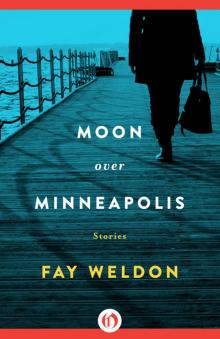 Moon Over Minneapolis
Moon Over Minneapolis The New Countess
The New Countess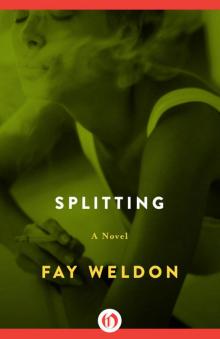 Splitting
Splitting After the Peace
After the Peace Habits of the House
Habits of the House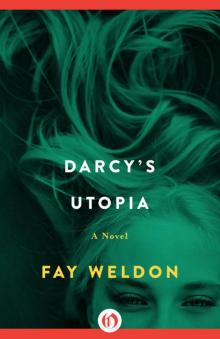 Darcy's Utopia
Darcy's Utopia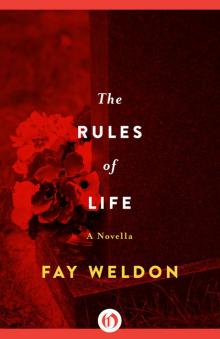 The Rules of Life
The Rules of Life Kehua!
Kehua! Before the War
Before the War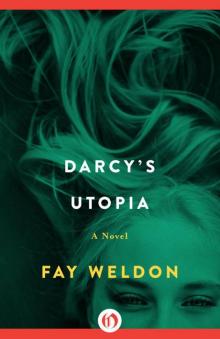 Darcy's Utopia: A Novel
Darcy's Utopia: A Novel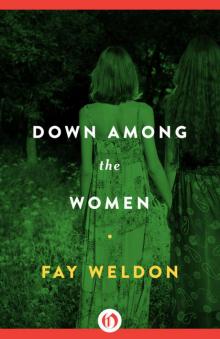 Down Among the Women
Down Among the Women Letters to Alice
Letters to Alice 3 Great Historical Novels
3 Great Historical Novels Female Friends
Female Friends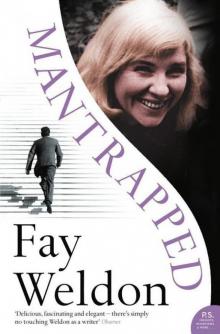 Mantrapped
Mantrapped The Bulgari Connection
The Bulgari Connection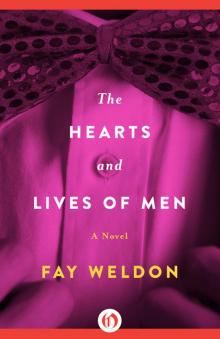 The Hearts and Lives of Men
The Hearts and Lives of Men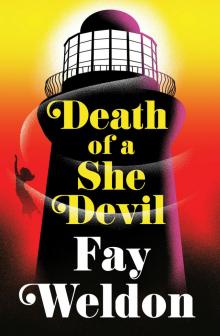 Death of a She Devil
Death of a She Devil